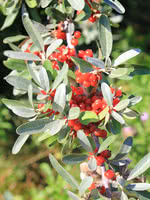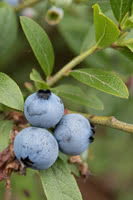Mon-Fri 9am - 5pm Mountain time
Silver Buffalo Berry vs Lowbush Blueberry
Shepherdia argentea
Vaccinium angustifolium
Silver Buffalo Berry is a cold hardy, ornamental shrub that is commonly used in the first row of shelterbelts instead of caragana or lilac. It features subtle yellow flowers, smooth grey bark, and red fruit. On occasion orange fruit is produced and rarely a yellow fruit. Please note: we regularly collect the rare yellow and orange fruit to use for our seed source.
Long-lived and slow growing, Silver Buffalo Berry is commonly found around sloughs, in coulees, and on light soils across the prairies, and grows best in full sun.
Buyers can enjoy increased bird life to their property, as this shrub acts as a habitat plant. It is also commonly planted for its ornamental and winter interest. It is native to parts of central and western North America.
This species is also known as one of the more salt-tolerant species for those with saline soils.
Note: this berry has mixed reviews when fresh, but makes a desirable jam or jelly with what is described as a clove and pear taste.
Lowbush Blueberry, commonly known as the Wild Lowbush Blueberry, is often wild-harvested and thrives in low pH acidic soil. This early low-bush blueberry produces white and pink bell-shaped flowers in the spring. Its fruit is smaller in size than high bush blueberry plants and is more flavourful with an intense blueberry taste-masking it perfect for fresh eating, baking, and preserves.
Note: Blueberries require very specific soil conditions. They need well-drained soil with a pH between 4.5 and 5.0. If the starting pH of your soil is between 5.1 and 6.2 you can lower it by adding sulfur. We recommend against planting blueberries in soil with a starting pH greater than 6.2. Please do your own research before buying any blueberry plants.
Silver Buffalo Berry Quick Facts
Lowbush Blueberry Quick Facts
In row spacing: 0.9 - 1.2 m (3 - 4 ft)

